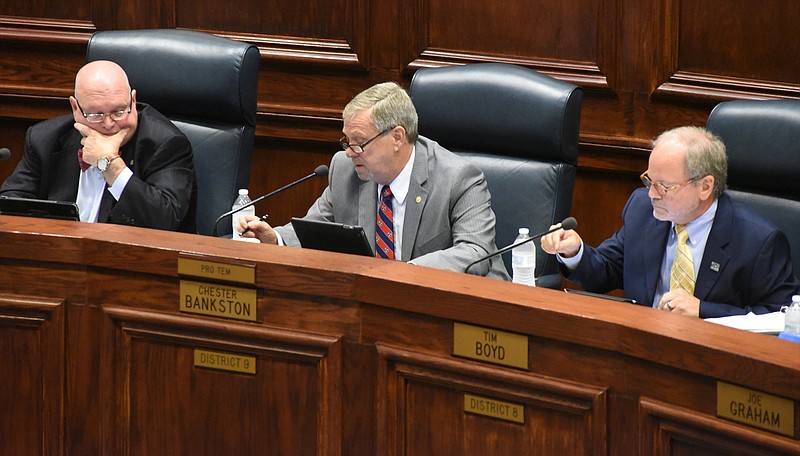The record $679.6 million budget the Hamilton County Commission passed Wednesday does not include discretionary money, even though six commissioners fought for those funds last year.
"I have not received one phone call, not one email, not one text pleading with me to keep discretionary funds," Tim Boyd, one of those six commissioners, said. "If they are not going to stand behind me and fight for discretionary funds, then I'm not going to spend political capital to be the stalwart for discretionary funds."
The 2017 budget calls for a $14.2 million increase over last year's budget, and includes an additional $12 million for the county education system, $5.2 million more for higher health insurance costs and $2.65 million needed to pay for a 2.5 percent employee salary bump.
The budget does not call for a property tax increase, but it does anticipate 2 percent revenue growth.
Commissioners voted 8-0 in favor of the budget. Commissioner Randy Fairbanks did not attend the voting session.
Boyd, who recently called for the commission to have a frank discussion about discretionary fund policy "to put the matter to bed once and for all," said he wondered whether discretionary funds will return in light of the public's silence on the matter.
In the past, commissioners often have used discretionary funds for special community projects that might not get funded through the typical budgeting process, such as school athletics and a variety of youth programs. The items still come before the entire commission for approval.
Although Boyd described providing discretionary commissioner funds as a controversial policy, he also said he has seen the money do some good things for beneficial programs that would otherwise go overlooked.
A Tennessee government watchdog group described discretionary money as a county commission slush fund.
In June 2015, commissioners Chester Bankston, Boyd, Fairbanks, Jim Fields, Warren Mackey and Sabrena Smedley amended the 2016 budget proposal to take $900,000 from the county's $91 million general fund balance and use it for discretionary spending. They later overturned Hamilton County Mayor Jim Coppinger's veto of the amended budget.
At the time, Bankston called the measure "the right thing to do."
"I have so many projects in my district that just don't get funded outside of discretionary spending," Bankston said.
Commissioners Gregory Beck, Joe Graham and Marty Haynes did not support the measure.
When discretionary spending items come before the body, Graham simply votes "present" if the money came from the general fund.
Graham has said that he does not like playing the philanthropist with taxpayer dollars.
Boyd said he questioned whether discretionary money will return when the media "drills" commissioners over it and the public shows no support for it. He also said he wondered if the beneficiaries of discretionary money have become complacent.
If the public shows interest in discretionary funding, commissioners will need to sit down and have a serious discussion about it, he said.
During the voting session, Boyd praised Coppinger and his staff for addressing his concerns about the budget proposal. Having missed a series of budget workshops in May and June, he said he appreciated the willingness of the mayor's office to meet with him last week.
"Hamilton County is in very, very good shape," Boyd said, adding that he "enthusiastically" endorsed the proposal and agreed with 98 percent of it.
"We have limited funds, and we're using them wisely," Graham said when the mayor presented the full budget to the commission in early June.
A snapshot of the approved budget shows that the Hamilton County Department of Education will receive $417.7 million, or 62 percent of the spending, in the coming fiscal year.
Another 3 percent of the overall budget goes to the school system in the form of debt service for capital projects.
Coppinger's proposal also calls for $90.8 million, about 14 percent of the budget, to go toward public safety, which includes the sheriff's office, emergency management, emergency medical services and volunteer fire departments.
The Hamilton County Sheriff's Office accounts for $33.5 million, representing a 5.9 percent increase, which includes $606,000 for raises and $484,000 for eight school resource officers that have been paid for with grant money previously.
Health services will receive $23.2 million, amounting to 11 percent of the general fund budget.
The budget also calls for $27 million to fund the county's various constitutional offices, amounting to a 7.9 percent increase over the 2016 fiscal year.
"This is what taxpayers expect, a fiscally conservative approach to good government," Coppinger said in a news release after the commission's unanimous vote. "This is what we have delivered for the sixth year in a row, without a tax increase while maintaining our valued AAA bond rating from three top rating agencies."
Contact staff writer Paul Leach at 423-757-6481 or pleach@timesfreepress.com. Follow him on Twitter @pleach_tfp.
